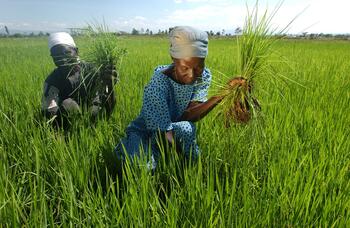In southern Africa, the predicted 2°C rise in temperature will destabilize farming systems. Coping mechanisms, livelihood strategies and the cost of adaptation options for smallholder farmers are not sufficiently understood in the region because the majority of research is focused on ecological assessment and identifying the vulnerability of households. In addition, most research is conducted at national and regional levels, with a gap in scientific evidence at a local level to inform policy decisions for effective smallholder adaptation.
In response, the Food, Agriculture and Natural Resources Policy Analysis Network (FANRPAN), prepared a study focused on generating empirical evidence to inform the policy and decision making process on how climate change will affect food security and livelihood options for rural communities in semi-arid districts of Lesotho, Malawi and Swaziland.
©FAO/Ami Vitale / FAO


